- Home
- Madeleine Roux
House of Furies Page 3
House of Furies Read online
Page 3
The driver snorted.
“And what do we call you?” the uncle asked, staring with bold suspicion at the crone. His coat buttons flashed in the lantern light, gold, an intricate Celtic cross pattern worked into the metal of them.
“Why, me?” Her voice, still softened, quavered like a plucked harp string in the gloom. “You can just call me Granny. Now eat up and get to work. It’s still a long way to Coldthistle House.”
“Shall I call you ‘Granny,’ too?” I asked, helping her dish up what was left of the porridge for the men. The tattered sleeve of her coat slid up her wrist as she stirred the pot, and, though but an inch was revealed, I saw several strange markings. Tattoos, perhaps; symbols I didn’t recognize. She quickly fixed her coat, but she had seen my wandering eyes.
“Not with that attitude,” she muttered. “There are hungry travelers to feed and a wagon to fix. Vexing me should be the last of your priorities this night.”
“Yes, Granny,” I replied, still with a smirk. Let her keep her secrets, I thought—as long as she delivered on her promise to give me employment and shelter, I would count her as a friend. Or an ally, at least.
A shiver ran through the buckthorn and birch crowding the road. Trees shaking at night always filled me with dread—it was a sound that made me long for a warm bed and thick walls. The others heard and felt it, too, shrinking down into their collars. Foster had left the safe yellow ring of the firelight without eating, choosing instead to rummage in their coach for tools.
“It’s a spot of luck that we found you,” Lee said, taking his bowl of porridge from the old woman and tucking in. He ate precisely, with a nobleman’s neatness. For a stranger, he stood close to us, a mark of a trusting nature. His uncle, by contrast, ate apart. The boy didn’t protect his coat pockets well, and even a fence less proficient than I would have no trouble swiping the coins from him in a wink.
“A spot of luck,” his uncle spat, shaking his head. “This will put us back by hours now. ’Tis folly to linger here on the side of the road in full dark. We are easy fodder for cutpurses.” At this, he gave me a cold, hard stare.
God help me, he wasn’t wrong. The old woman and me, we were the thieves, the threat.
“All that jostling in the carriage has made him grumpy,” Lee cut in with a chuckle. “I apologize on his behalf, and not for the last time, I’m sure.”
“The cold makes curmudgeons of us all,” the crone said, almost politely. “Do not fear overmuch. I travel this road frequently, and it is safer than most.”
She had served up the last of the porridge and now gathered her threadbare clothes close around her, moving away from the fire and toward the cold, dark emptiness of the fields and forests beyond. I watched her go, only half listening to the men discuss the state of the wagon and the most expedient way to mend it. There was an odd sort of deliberateness to the way the crone strode away from us, as if she had suddenly heard something out there in the field.
At first they seemed a trick of the eye, the little lights that began to dance in the dark. But no, they persisted and grew in number and brightness. The others did not notice, only me, and I watched what seemed like a hundred glittering eyes gather in front of the old woman, as if she were consulting a hidden cabal of yellow-eyed minions. A single, sharp hoot came from that direction, and it occurred to me that these were birds, owls, many of them flocking to that one spot near the old woman.
I hadn’t heard them arrive, but I did hear them go. Facing away from me, the crone gave a solitary nod. There was no telling if she had spoken to these birds or not, but then suddenly they all lifted into the air at once, and I knew it was no hallucination; I felt the buffeting wind of their wings as they departed, and saw the dusting of feathers like snow that drifted down and down and settled softly around the crone’s torn hem.
Chapter Five
It was silly, of course, to look for traces of the owls in full darkness. Still, I fought exhaustion, staring out the window of George Bremerton’s carriage.
The wagon rumbled along ahead of us, driven by the crone, and we followed along closely. The carriage driver, Foster, had suggested they lighten the wagon’s load as much as possible, and keep the back end of it unburdened to avoid further damage to the wheel. The crone would not let them touch a single item under the coverings, and instead ordered me to ride with them in the carriage. I did not see how the loss of only my small frame would be enough to ease the strain on the wagon, but the men were too cross, wet, and tired to argue with her.
“You can sleep, you know,” Lee said quietly. His uncle snored across from us on the opposite bench. The carriage smelled of pipe tobacco and whiskey, a comforting, warm scent I had not experienced in many years. It reminded me of leaving Ireland, of the dock workers who congregated on the waterfront, drinking and smoking, the ones who hooted and called at me and my mother when we boarded the boat for England.
“Nobody here will harm you,” Lee added.
It is not you I fear, oddly enough.
I didn’t take my eyes away from the window and what might be in the sky over the woods. “Did you not see a preponderance of owls?”
“Owls?” He laughed a little. “When?”
“Before we left,” I replied. Or ever. What a stupid question. But I had seen the feathers. I had felt the power of those wings beating the air. “In the field not far from the fire . . . I thought I saw dozens of owls.”
“I must have been too focused on the porridge,” he said. I looked over at him then, and he was blushing by the weak light of the outer lantern. It bobbed along, making tricks of our faces and of the shadows. “I would have liked to see such a thing.”
Belief. It was a strange feeling. He believed me. Miss Henslow would have beaten me for fibbing. She always thought I was spinning wild tales, even when I was certain I saw or heard a thing. Maybe it happened too often for her liking. Maybe it seemed as though I was somehow different, gifted or cursed with the ability to note odd reflections in mirrors or footsteps in the attic at night. I often felt others cringe away from me, even just strangers, as if they sensed something about me not even I understood.
But to be believed? I decided to forget the owls. It was enough that this near stranger did not question the event.
“Where are you from?” I asked, now more than curious about this earnest young man with the startling eyes.
“Canterbury, but I should be in London now,” he said, sounding forlorn. It was his turn to look away and toward the window, those eyes less bright and more inscrutable. “Uncle thinks something went funny with my inheritance. It all went to my cousin, you see, when my guardian died. John Bremerton. He’s a proper lord, raised me, but just as a ward.” He leaned toward me and lowered his voice, casting a wary eye in his uncle’s direction. “Uncle George thinks I’m a Bremerton. A bastard one, but still . . .”
“So the money could be yours,” I finished. How intriguing. “Or part of it, at least. Some sort of entitlement.”
“Precisely. I loved my guardian. He was always kind, always fair, and the money doesn’t really mean all that much to me. The stipend he left me seemed quite generous, in fact.”
“Then why come all the way to Malton and beyond?”
“I suppose the answer is twofold. Uncle wants to visit the spring near Coldthistle for its curing properties. He has an old wound in his ankle that still bothers him. That, and he thinks my mother is working near here, and that she will have proof of my parentage.” He shrugged, and his shoulders sank with a burdensome weight. “Vast wealth does have a certain appeal.”
“A certain appeal?” I couldn’t keep the steel edge out of my voice. A certain appeal. Looking harder at this young man, I began to question my initial perception of him. Had his lovely golden hair and bright eyes stupefied me? Perhaps he was dull; dull and flippant.
He had the good grace to look shocked and then ashamed. Of course I had no business raising my voice to someone so obviously above my social rank, but i
t hardly mattered—once he was done staying at the boardinghouse, we would part ways, and I doubted very much the crone would mind if he told her of my impropriety. She knew what she was getting with me—a thief and a runaway.
“Heavens, I’m sure that sounded foolish,” he said. One could practically see his collar constricting and choking his voice. “I never wanted for much, and clearly that’s made me careless. Lord Bremerton would be furious. He did not raise a cur.”
Mollified for the moment, I folded my hands in my lap and glanced at his snoring uncle. He had the look of a man who had once been handsome, but age or hard drinking or a combination of the two had turned him soft and red around the edges. His hair was thinning. A perpetual rosiness splotched his cheeks and nose, a beak that reminded me distinctly of an aubergine.
There was an air about the man I did not like, and an urge to turn out his pockets and steal from him at the first available opportunity rose sharply, like a hunger pang. Even if I were alone, I would think better of it. Under his seat, behind his shins, I saw a number of sabers sheathed in fine leather scabbards. The men were prepared for robbers.
“Have I offended?” Rawleigh suddenly asked. “It would be too like me to do so. And this soon! I really should learn to shut my mouth sometimes. I have the greatest respect for servants. It’s a thankless position, truly; I wouldn’t last half a second!”
Stop talking.
“Please say I haven’t offended you,” he added with a sheepish half smile.
“You have, but you’re forgiven.” There was no point in coddling him. It was obvious to me someone else had done plenty of that already. “I never expect consideration. It’s the easiest way to avoid disappointment.”
“What a very sad way of looking at things . . .”
A soft, fluttering noise at the window drew my attention. “And yet it keeps me alive.” The glass was ice cold when I pressed my nose to it, watching, rapt, as a barn owl flew lower over the carriage, so low that it grazed the roof. “There! Did you see that?”
Lee scrambled to get closer, ducking his head to follow my pointed finger. “Astonishing! One of your fabled owls!”
It flew on ahead, but what was more, it glided toward a rising hill. Dawn broke apart the horizon, wide painter’s strokes of inky blue turning lighter by the moment. A tall, two-towered manor rose as if from the hill itself, a stark, black silhouette that grew only taller and more improbable as we neared it. No woods surrounded the manse; the birch and rowan stayed well back, as if reluctant to grow on the house’s grounds.
I had lost feeling in my nose, and the cold of the window spread through to my fingertips and toes. Coldthistle House. Aptly named. It looked thorny with warning, tall and spindly and precarious, and, with the sun at its back, not a building of stone and mortar but a place of pure shadow.
“Turn the carriage around,” I whispered. But my voice was lost and it was too late. We had started up the hill, and feeling returned to my fingers for an instant. I looked down and shivered; Lee had gone pale and perfectly still, and he clutched my hand in his as if in dread.
Chapter Six
Exhausted, I stumbled out of the carriage and onto the desolate grounds surrounding the manse. Even with Foster helping me down, I was unsteady, clumsy, unsure if perhaps the lack of sleep was responsible for the hard pit forming in my stomach.
“How cozy.” Lee had landed on much sturdier footing behind me, surveying the drive with a wobbly smile. “Or, hmm . . .”
I was struggling for words, too. Coldthistle reminded me, horribly enough, of Pitney House. My old school had been more like a dungeon than a place of learning. The pit in my gut widened, and I winced, feeling at once relieved to be away from there but also guilty for leaving behind one tolerable peer. Very well, friend. It was easier not to think of her as a person I liked, because now I was free of Pitney’s grasp and she remained.
Jenny. Poor, sweet, trusting Jenny. Well, she was far away from me now and there was nothing I could do to help her.
And she might be better off, I mused, taking in the tall, narrow towers that perched like stony fraternal twins on the top of the mansion. It was one of the old, great houses of England, stoic and angular, with a number of yawning windows that looked dark and hollow in the dawn light. A few neglected topiaries lined the path up to the door, their shapes more like gargoyles than circles or squares. A barn peered out from behind Coldthistle House. It looked to be newer and less cruelly appointed, and one’s eye went immediately back to the mansion.
My new home.
No, I corrected myself with a grimace, moving slowly toward the wagon to see what the crone wanted of me—not a home but a place of employment. Simple employment. It would be a waypoint, just a place to stop over while I worked out what to do with my life. If I could save up a little money, then I might be able to make it north and take a ship to Ireland. Or to the Americas. Both options felt equally distant and dreamlike, especially with Coldthistle House looming before me. Without a family to return to or a real home to recall, the future never felt important. After Pitney, most girls were either absorbed by the school to teach the next generation or they were picked out for governess positions by families in need.
Even scullery work sounded preferable to teaching some rich lord’s brat.
The gravel drive crunched under my shoes, and the crone climbed down from the driver’s box just as I approached. I glanced back at Lee and his uncle, who waited on their driver to collect a modest amount of luggage. Lee gave me a little wave and then started toward the house, his uncle clearly in no mood to dawdle.
They would have warm rooms waiting for them, even baths. Looking at the crone’s sour expression, I doubted there was anything but toil in my very near future.
“Don’t go falling for that boy,” she muttered, skewering me with her one good eye.
The suddenness of it caught me off guard.
“Of course not,” I replied. “He’s a guest and I’m the help. I’m not stupid, you know.”
She considered that for a moment, her jaw working back and forth in concentration. “Hmm. That remains to be seen. Not like his uncle would let you have anything to do with each other. That one cares for coin and only coin.”
“How do you know that?” But I had suspected the same.
Hobbling toward the back of the wagon, she rubbed at her hip. “You’ve met one miser, you’ve met them all. Now what are you doing following me about?”
“I thought you might need assistance with, um, with the cargo.”
“You’re no use to me hungry and tired,” the crone said with a snort. “And besides, Chijioke will be along once the house stirs. Go along inside. Take the stairs up to the second floor and go right. Your quarters are at the very end of the hall.”
My quarters? I hadn’t imagined I would get a room to myself. That hadn’t been the case for so many years, I wondered if it would be lonely to fall asleep to just the sound of my own breathing.
“I’ll send someone to wake you in a few hours,” the crone added, waving me away.
“Thank you,” I said reflexively, but in truth I probably did owe her a great deal.
“Don’t thank me yet, child; the day is young.”
I refused to indulge in such cynicism. The house was a bit shabby, certainly, and those monstrous topiaries did not make me feel welcome as I passed beneath them, but for now I had a place to rest my head and earn money. That was more than most runaways could hope to have. I shuddered as I stepped gingerly over the threshold, the massive doors opening just at the middle, enough for me to slip inside. There were darker alternatives to scullery work . . . I might have easily ended up in a women’s prison or working in a brothel, which was precisely what my father had foreseen for me just before my mother ripped me from the house.
Prospects were low, very low, for a lone Irish girl with no connections, no money, and no means to fabricate those things.
The foyer of Coldthistle House was blazingly hot. A sit
ting room through an open arch to the left glowed with rosy color, a fire crackling away and heating this ground floor. There was no trace of Lee or his uncle—they must have been settled already. Yet I saw nobody about, and the place was unnaturally silent.
It’s just after dawn, you idiot girl, of course it’s still.
I crossed a tattered carpet to the staircase on the right of the foyer. It was grand but austere, and the walls around it were clustered with paintings of birds. Ornithological studies and sketches, though the painter did not have much of an eye for artistry. Those odd, stringy creatures glowered down at me from every angle. It was almost enough to make me miss the oddest feature of the room—a large green door directly opposite the main entrance of the house. There was no way it was original to the mansion; no wealthy family would have wanted such an awkwardly placed door. Perhaps it was an addition; added storage or a pantry of some kind.
My exhaustion lifted for a moment, almost as if new life had gusted into me. And the green door called to me.
It sang.
Not a song anyone else could hear, I’ll wager, but it was as if thin tendrils leaked out from under it, speeding toward me, entering through my ears and coaxing me through whispered melody. Even the words to this song were completely unknowable, some odd, guttural language that sounded like nonsense, nonsense that resolved into guidance. It filled my head with thunder, like a headache but thicker, crowding out any of my own thoughts that might seep in and bring reason.
And like a fool, I listened, drifting toward the glossy green paint of the door, reaching out for the ornate, golden knob . . .
“I wouldn’t if I were you.”
A high, tiny voice came from behind me. I froze, turning to find a girl of perhaps eleven years staring at me from an open doorway. The kitchens were visible behind her. She wore a simple, white frock that was starkly clean, almost glowing. Her hair was parted at the middle, severely braided into two plaits that dangled over her shoulders. Half of her face was covered in a purplish port-wine stain, a hideous mark on an otherwise lovely child.

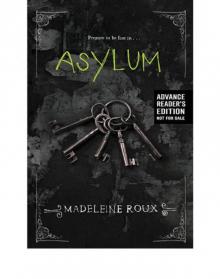 Asylum
Asylum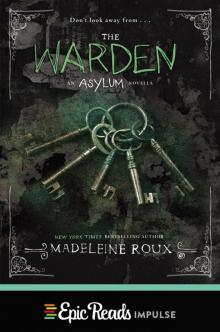 The Warden
The Warden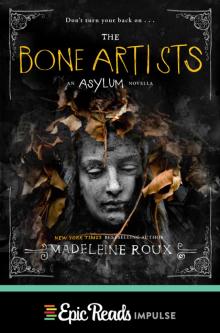 The Bone Artists
The Bone Artists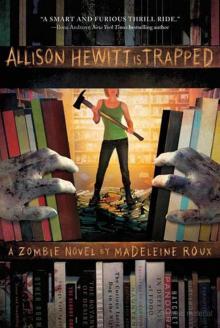 Allison Hewitt Is Trapped
Allison Hewitt Is Trapped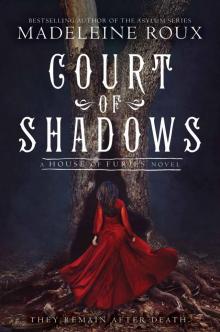 Court of Shadows
Court of Shadows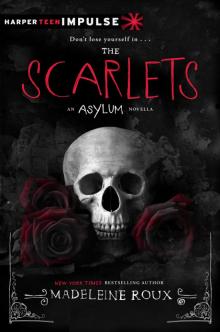 The Scarlets
The Scarlets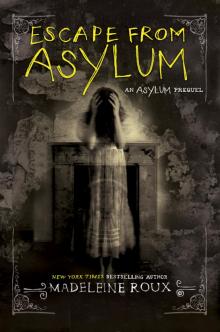 Escape From Asylum
Escape From Asylum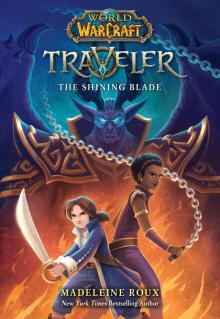 The Shining Blade
The Shining Blade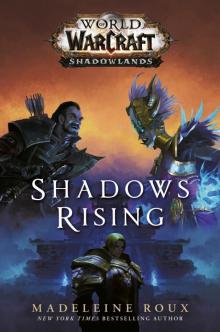 Shadows Rising (World of Warcraft: Shadowlands)
Shadows Rising (World of Warcraft: Shadowlands)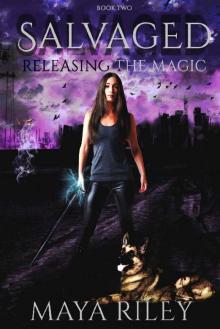 Salvaged
Salvaged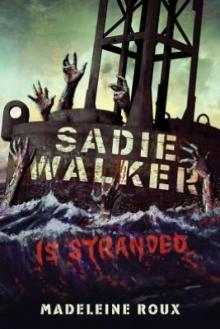 Sadie Walker Is Stranded
Sadie Walker Is Stranded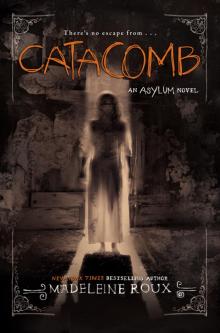 Catacomb
Catacomb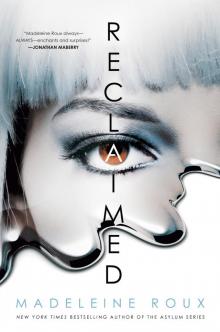 Reclaimed
Reclaimed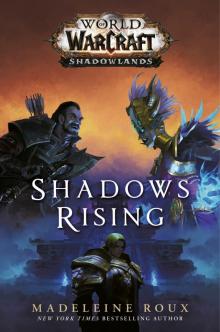 Shadows Rising (World of Warcraft
Shadows Rising (World of Warcraft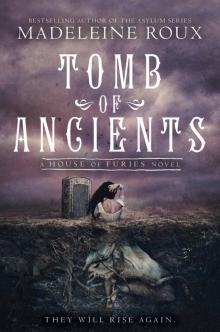 Tomb of Ancients
Tomb of Ancients